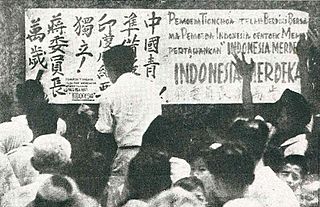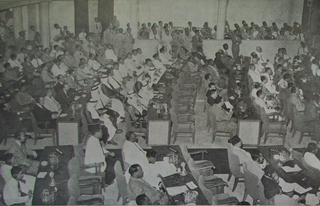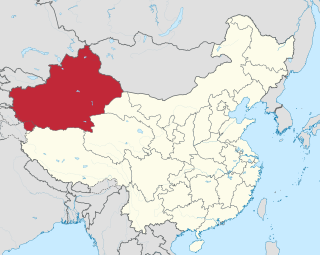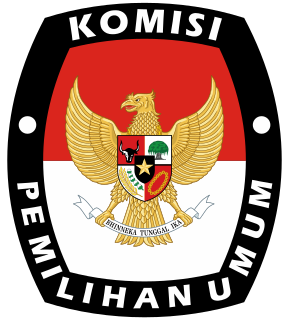
Borneo is the third-largest island in the world and the largest in Asia. At the geographic centre of Maritime Southeast Asia, in relation to major Indonesian islands, it is located north of Java, west of Sulawesi, and east of Sumatra.

Indonesia, officially the Republic of Indonesia, is a country in Southeast Asia and Oceania between the Indian and Pacific oceans. It consists of over seventeen thousand islands, including Sumatra, Java, Sulawesi, and parts of Borneo and New Guinea. Indonesia is the world's largest island country and the 14th-largest country by area, at 1,904,569 square kilometres. With about 270 million people, Indonesia is the world's fourth-most populous country and the most populous Muslim-majority country. Java, the world's most populous island, is home to more than half of the country's population.

The politics of Indonesia take place in the framework of a presidential representative democratic republic whereby the President of Indonesia is both head of state and head of government and of a multi-party system. Executive power is exercised by the government. Legislative power is vested in both the government and the bicameral People's Consultative Assembly. The judiciary is independent of the executive and the legislature.

Southeast Asia, also spelled South East Asia and South-East Asia, and also known as Southeastern Asia or SEA, is the geographical southeastern subregion of Asia, consisting of the regions that are south of China, south-east of the Indian subcontinent and north-west of Australia. Southeast Asia is bordered to the north by East Asia, to the west by South Asia and the Bay of Bengal, to the east by Oceania and the Pacific Ocean, and to the south by Australia and the Indian Ocean. Apart from the British Indian Ocean Territory and two out of 26 atolls of Maldives in South Asia, Southeast Asia is the only other subregion of Asia that lies partly within the Southern Hemisphere. The majority of the subregion is still in the Northern Hemisphere. East Timor and the southern portion of Indonesia are the only parts that are south of the Equator.
The United Nations Commission on Human Rights (UNCHR) was a functional commission within the overall framework of the United Nations from 1946 until it was replaced by the United Nations Human Rights Council in 2006. It was a subsidiary body of the UN Economic and Social Council (ECOSOC), and was also assisted in its work by the Office of the United Nations High Commissioner for Human Rights (UNOHCHR). It was the UN's principal mechanism and international forum concerned with the promotion and protection of human rights.

Chinese Indonesians or Orang Tionghoa Indonesia and colloquially Chindos, are Indonesians whose ancestors arrived from China at some stage in the last eight centuries.
Asian values was a political ideology of the 1990s, which defined elements of society, culture and history common to the nations of Southeast and East Asia. It aimed to use commonalities – for example, the principle of collectivism – to unify people for their economic and social good and to create a pan-Asian identity. This contrasted with perceived European ideals of the universal rights of man. The concept was advocated by Mahathir Mohamad and by Lee Kuan Yew, as well as other Asian leaders. It has been often used by nondemocratic leaders to justify repression of political opponents, which has been described as violating their human rights, through the justification that "human rights are not part of Asian values".

The Southeast Asia Treaty Organization (SEATO) was an international organization for collective defense in Southeast Asia created by the Southeast Asia Collective Defense Treaty, or Manila Pact, signed in September 1954.

Nahdlatul Ulama is an Islamic organization in Indonesia. Its membership estimates range from 40 million (2013) to over 90 million (2019), making it the largest Islamic organization in the world. NU also is a charitable body funding schools and hospitals as well as organizing communities to help alleviate poverty.

Suharto resigned as president of Indonesia on 21 May 1998 following the collapse of support for his three-decade-long presidency. The resignation followed severe economic and political crises over the previous six to twelve months. Vice president B. J. Habibie took over the presidency.

The May 1998 riots of Indonesia, also known as the 1998 tragedy or simply the 1998 event, were incidents of mass violence, demonstrations, and civil unrest of that occurred throughout Indonesia, mainly in Medan in the province of North Sumatra, the capital city Jakarta, and Surakarta in the province of Central Java. The riots were triggered by corruption, economic problems, including food shortages and mass unemployment. It eventually led to the resignation of President Suharto and the fall of the New Order government, which had been in power for 32 years. The main targets of the violence were ethnic Chinese Indonesians, but most of the casualties were caused by a massive fire and occurred among looters.

The first large-scale Asian–African or Afro–Asian Conference—also known as the Bandung Conference —was a meeting of Asian and African states, most of which were newly independent, which took place on 18–24 April 1955 in Bandung, West Java, Indonesia. The twenty-nine countries that participated represented a total population of 1.5 billion people, 54% of the world's population. The conference was organized by Indonesia, Burma (Myanmar), India, Ceylon, and Pakistan and was coordinated by Ruslan Abdulgani, secretary general of the Ministry of Foreign Affairs of the Republic of Indonesia.
The topic of human rights in Asia is one that encompasses an immense number of states, international governmental organizations, and non-governmental organizations. All these institutions contribute a variety of services and perspectives towards human rights, covering topics including the enforcement, monitoring, and criticisms of human rights in Asia. There is no single body that covers all of human rights in Asia, as such a diverse and widespread region requires a number of institutions to properly monitor the multitude of elements that fall under the scope of human rights. There have historically been numerous criticisms of human rights in Asia, but a variety of new treaties and conventions now strive to accomplish a level of human rights as they are known on the international stage.

Legislative elections were held in Indonesia on 3 July 1971, the first under the New Order regime. There were ten participants; nine political parties and the "functional group" Golkar, which came first with more than 60 percent of the vote, resulting in an absolute majority in the People's Representative Council.

East Timor or Timor-Leste, officially the Democratic Republic of Timor-Leste, is an island country in Southeast Asia. It comprises the eastern half of the island of Timor, the nearby islands of Atauro and Jaco, and Oecusse, an exclave on the northwestern side of the island surrounded by Indonesian West Timor. Australia is the country's southern neighbour, separated by the Timor Sea. The country's size is 15,007 square kilometres (5,794 sq mi).

Indonesian nationality law is regulated by the 1945 Constitution, as amended; various statutes on nationality, as revised over time; as well as international agreements to which Indonesia has been a signatory. These laws determine who is, or is eligible to be, a national of Indonesia. The legal means to acquire nationality and formal membership in a nation differ from the relationship of rights and obligations between a national and the nation, known as citizenship. Indonesian nationality is typically obtained either on the principle of jus soli, i.e. by birth in Indonesia; or under the rules of jus sanguinis, i.e. by birth abroad to at least one parent with Indonesian nationality. It can also be granted to a permanent resident who has lived in Indonesia for a given period of time through naturalization.

The Xinjiang conflict, also known as the Uyghur–Chinese conflict, is an ongoing ethnic conflict in China's far-northwest autonomous region of Xinjiang. It is centred around the Uyghurs, a Turkic minority ethnic group who constitute a plurality of the region's population.

The General Elections Commission is the body that organises elections in Indonesia. Its responsibilities include deciding which parties can contest elections, organising the voting and announcing the results and seats won in the various branches of the government.
Res Publica University was founded in Jakarta in 1960. It was sponsored by the group Baperki, an organization mainly of Indonesian citizens of Chinese descent including members of the Indonesian Communist Party (PKI). The university was established in response to ethnic quotas on university enrollment implemented in the 1950s. After a coup attempt in Indonesia, the Res Publica campus was attacked by anti-communists in 1965. Students barricaded themselves in the college of technology building which was burned down by the attackers along with the rest of the campus. A new private HEI, Trisakti, was established on the site and many of the former students barred entry because of alleged Communist ties.

Mr. Tjung Tin Jan or Jani Arsadjaja was an Indonesian politician and lawyer of Chinese Indonesian origin.















